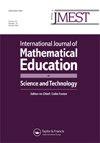The supportive role of active learning in a calculus course on low precalculus proficiency students
IF 0.6
Q3 EDUCATION & EDUCATIONAL RESEARCH
International Journal of Mathematical Education in Science and Technology
Pub Date : 2023-09-22
DOI:10.1080/0020739x.2023.2255189
引用次数: 0
Abstract
AbstractCollege calculus plays an important role in STEM students’ degree and career aspirations. One of the key factors considered in assessing a student’s ability to be successful in calculus is their proficiency in topics from prior mathematics courses such as algebra and precalculus. This study set out to examine the impact of students’ precalculus proficiency on their achievement in introductory calculus based on their classroom environment. Results from the implementation of the Modeling Practices in Calculus (MPC) model, an innovative, active learning approach, are presented. Using a randomized-controlled trial research design, students were randomly assigned to MPC and traditional, lecture-based calculus sections. The Precalculus Concept Assessment inventory was administered to gauge students’ precalculus proficiency. We found that students exposed to the MPC model were more likely to be successful in their calculus course, even if they began with low precalculus proficiency. Also, students enrolled in the MPC sections saw significant growth in their precalculus proficiency from the beginning to the end of the semester. Additionally, we observed this model providing support for students in key demographics (low proficiency, female, first and second year undergraduates) in terms of the development of their proficiency that they may not receive in traditional classrooms.KEYWORDS: Active learningcalculusprecalculus proficiencycalculus achievementSubject classification code: 97D40 AcknowledgementsWe thank the instructors, students, and Learning Assistants involved in this study for their support during the administration and collection of data. We also thank our institution and the State of Florida for the initial support that made this project possible. Any opinions, findings, and conclusions in this paper are those of the authors and do not necessarily reflect the views of the National Science Foundation.Disclosure statementNo potential conflict of interest was reported by the authors.Additional informationFundingThis work was supported by the US National Science Foundation [grant number: 1832450].主动学习在微积分课程中对低微积分基础学生的支持作用
摘要大学微积分在STEM学生的学位和职业理想中起着重要作用。评估一个学生是否能成功学习微积分的关键因素之一是他们对基础数学课程(如代数和微积分预科)的熟练程度。本研究旨在探讨基于课堂环境的微积分预科水平对微积分入门成绩的影响。本文介绍了微积分建模实践(MPC)模型的实施结果,这是一种创新的、主动的学习方法。采用随机对照试验研究设计,学生被随机分配到MPC和传统的基于讲座的微积分部分。运用微积分前概念评估量表评估学生的微积分前熟练程度。我们发现,接触MPC模型的学生更有可能在微积分课程中取得成功,即使他们开始时的微积分基础水平较低。此外,从学期开始到学期结束,参加MPC课程的学生的微积分基础水平有了显著的提高。此外,我们观察到该模型为关键人口统计数据(低熟练程度,女性,一年级和二年级本科生)的学生提供了他们在传统课堂中可能无法获得的熟练程度发展方面的支持。关键词:主动学习;微积分;预微积分熟练程度;;;;;;;;我们还要感谢本机构和佛罗里达州最初的支持,使这个项目成为可能。本文中的任何观点、发现和结论都是作者的观点,并不一定反映美国国家科学基金会的观点。披露声明作者未报告潜在的利益冲突。本研究得到了美国国家科学基金会的支持[资助号:1832450]。
本文章由计算机程序翻译,如有差异,请以英文原文为准。
求助全文
约1分钟内获得全文
求助全文
来源期刊

International Journal of Mathematical Education in Science and Technology
EDUCATION & EDUCATIONAL RESEARCH-
CiteScore
3.30
自引率
11.10%
发文量
123
期刊介绍:
Mathematics is pervading every study and technique in our modern world, bringing ever more sharply into focus the responsibilities laid upon those whose task it is to teach it. Most prominent among these is the difficulty of presenting an interdisciplinary approach so that one professional group may benefit from the experience of others. The International Journal of Mathematical Education in Science and Technology provides a medium by which a wide range of experience in mathematical education can be presented, assimilated and eventually adapted to everyday needs in schools, colleges, polytechnics, universities, industry and commerce. Contributions will be welcomed from lecturers, teachers and users of mathematics at all levels on the contents of syllabuses and methods of presentation.
 求助内容:
求助内容: 应助结果提醒方式:
应助结果提醒方式:


